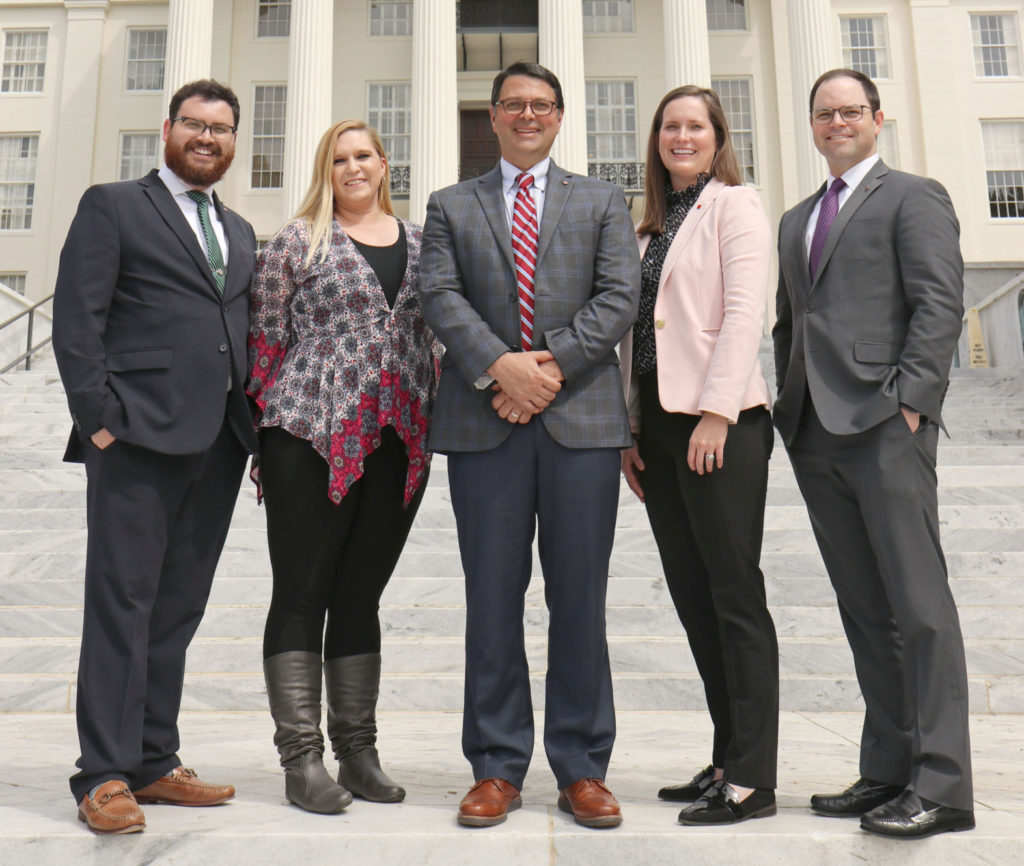Grassroots Engagement Earns Legislative Victories

By Jeff Helms
Limited access to the Alabama Legislature didn’t stop the Alabama Farmers Federation from securing victories for members during the 2021 Regular Session, as the organization enhanced communications and grassroots engagement.
“The Federation was founded 100 years ago by farmers who wanted to have a more powerful voice in public policy,” said Federation External Affairs Department Director Matthew Durdin. “As the Federation celebrates its centennial, we are honored to continue that mission.”
Agricultural bills signed into law included legislation allowing small farm wineries to sell directly to retailers and consumers; a measure easing restrictions on the purchase of license tags for farm and forest-product trucks; and a statute limiting enforcement of regulations and planning ordinances outside city limits.
“In each of these cases, our farmers saw a problem, approached our team and showed us the importance of passing legislation,” Durdin said. “That’s the value of a grassroots organization.”
SB 294 by Sen. Andrew Jones, R-Centre, defines a Small Farm Winery as one producing fewer than 50,000 gallons of wine a year from fruit that’s at least 50% Alabama-grown. It allows such operations to sell directly to restaurants, stores and individuals.
HB 460 by Rep. Wes Allen, R-Troy, lifts limits on the purchase of F4 farm tags for larger trucks. It also allows log trucks to purchase L tags and be exempt from the International Registration Plan. This new law puts Alabama farmers and loggers on a level playing field with counterparts in neighboring states.
SB 107 by Sen. Chris Elliott, R-Fairhope, freezes cities’ police jurisdictions at current lines and limits planning jurisdictions to 1.5 miles beyond city limits. Formerly, municipalities could enforce regulations up to 5 miles beyond city limits, making farmers and rural landowners subject to rules enacted by city councils where they have no vote.
The Legislature also passed SB 173, sponsored by Sen. Larry Stutts, R- Tuscumbia. The law requires agricultural lime to be labeled with information reflecting its ability to neutralize soil acidity.
Much of the session saw Republican super majorities in the Senate and House of Representatives debating medical marijuana and gambling. The Federation worked to ensure the medical marijuana bill, which eventually passed, included language providing Alabama farmers an opportunity to grow the crop. It also features detailed restrictions regarding the cultivation, processing and distribution of cannabis, as well as specific requirements for those appointed to the regulatory commission.
Efforts to create a statewide lottery and legalize gambling failed as competing interests disagreed over the number and locations of casinos. Federation members stepped into the fray in the final days of the session when those eager to resolve the gambling debate threatened to push through a substitute bill without giving legislators and constituent groups an opportunity to study its impact.
“I’ve said many times, ‘When our county leaders are united on an issue, we’re hard to beat,’” Durdin recalled. “We appreciate all the members who contacted their legislators on gambling and our priority bills.”
Durdin and the External Affairs team kept members informed throughout the session by utilizing the Capitol Connection e-newsletter, videos featuring key legislative leaders, the Alabama AgCast, phone calls and meetings. Joining Durdin on the team were Preston Roberts, director of agricultural legislation; John Allen Nichols, agriculture counsel; Jessica Mims, administrative assistant; and the Federation’s newest staffer at the State House, Casey Rogers, director of state legislative programs.
Despite the distractions caused by gambling and marijuana, the Legislature accomplished its only constitutionally required task: passage of the budgets. Both the General Fund (GF) and Education Trust Fund (ETF) will set records for government spending when they take effect Oct. 1.
Agriculture fared well in the budgets with the Federation securing funding for priorities including Ag in the Classroom, Sweet Grown Alabama, Concentrated Animal Feeding Operations and the Career Tech Initiative.
The $2.5 billion GF budget included $300,000 for the Sweet Grown Alabama program, up $50,000; $225,000 for the Farm to School program, up $105,000; and a new appropriation of $3 million for renovations at the Gilmore-Turnham Building on Auburn University’s campus.
The $7.67 billion ETF included $250,000 for the second year to revive a livestock judging program within the College of Agriculture at Auburn University.
